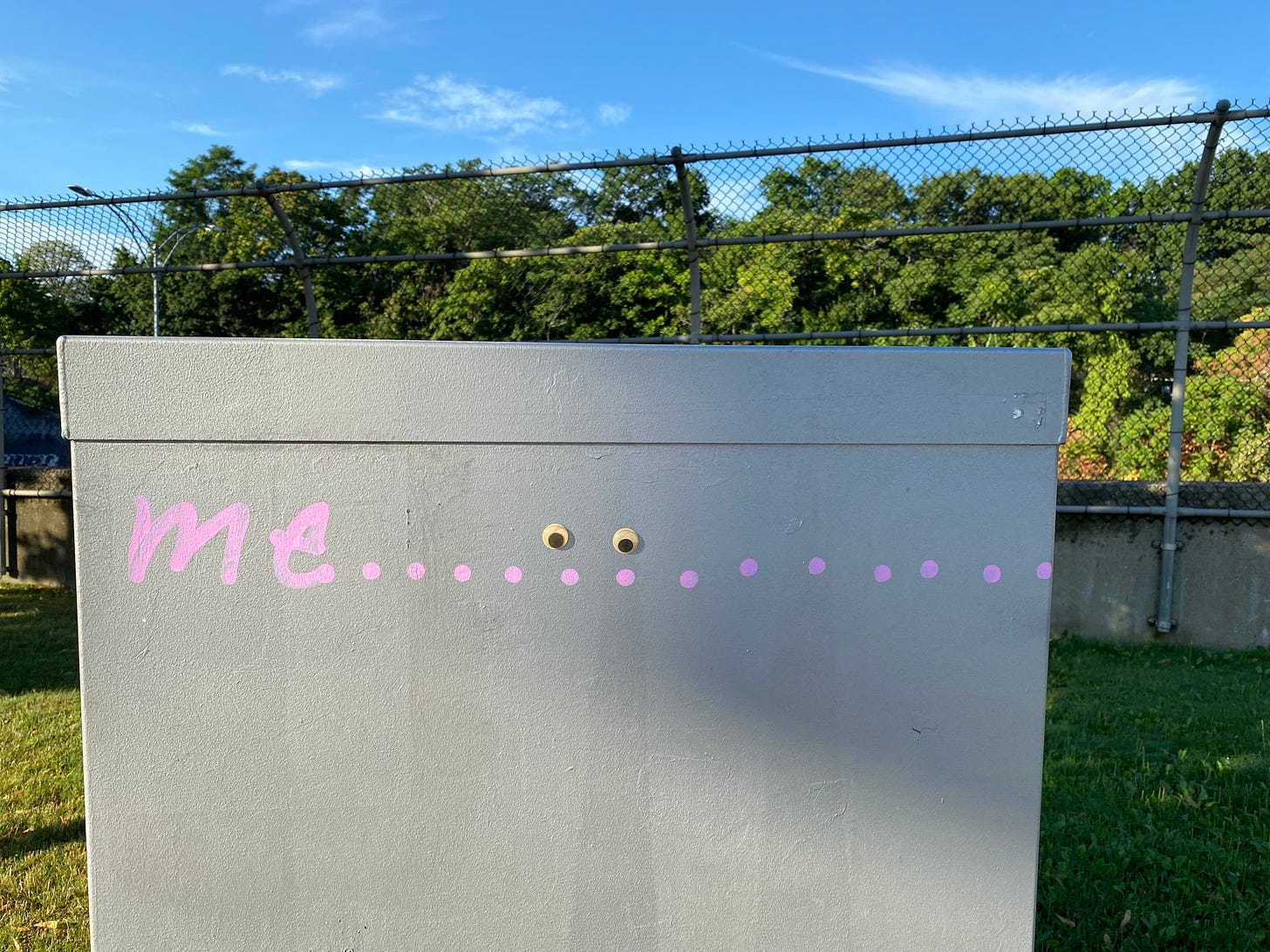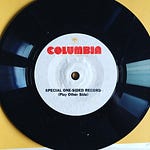I have the same strategy for learning about new music that I’ve had most of my life, though the technology has changed. It’s one-part editorial (magazines, blogs, social media accounts for critics I trust), one part social (friends, colleagues), and one part accidental (terrestrial or internet radio, Shazam while waiting in line at the convenience store). With almost all music available at any time, I also spend more time than ever with old music—rediscovering discographies, conducting deep dives on subgenres and producers. Because I have a day job and don’t have band practice obligations, I don’t spend as much time with music as I did when I was 17, but, adjusting for those differences, it’s close.
What I spend less time doing, though, is talking about music. It’s not that I don’t have friends I see or channels where I can share my thoughts.1 And I like lots of new songs. I just don’t feel a compulsion to actively share what I’m listening to.
I don’t passively share music, either. When Apple Music updated to let users follow friends and see what they were listening to, I set my account to private. This type of social listening isn’t the modern equivalent of telling someone what you like. It’s as if your headphones were radio towers, broadcasting every new hit, every comforting replay, and every dabble with a different artist to the world. What I choose says something about me. No matter what I pick, it will be less new, less experimental, less catchy, less important, less clever, less cool, less anything than whatever someone else has chosen (I wrote about this anxiety in the early days of infinite music a few weeks ago) There are some listening habits I don’t want people to know about, too. No one needs to notice that I’m listening to the John Prine song I put on when I’m sad and want to cheer up. Broadcasting makes every pleasure feel like a guilty pleasure.
Yes, I know we should banish the idea of guilty pleasures, because we shouldn’t feel guilty for liking something. I generally agree. Like what you like, as long as you’re not hurting someone. It’s notable this poptimist attitude has become even more widespread in the age of social media. Everybody likes something. The premise of a guilty pleasure is that it doesn’t fit in with the taste of your social group. But we now have a larger digital social group. It’s easier to like what you like when you have company.
Conveniently, this technological advance coincided with the beginning my thirties, a time when many of us become more shy about our listening. For some, it’s a natural aging out. Life gets busier and it’s harder to keep up with new music until, one day, you don’t hear anything you recognize. The effort at staying current that I opened this post with is driven mostly by a love of music, but I’d be lying if I didn’t say I was also motivated by a fear of becoming irrelevant, like Kevin Kline’s character in The Big Chill, who refuses to acknowledge any music released after his senior year of undergrad. (Although how relevant am I if this is the reference I go for?)
There’s a connection between the fear of aging out of culture and the impulse to share what we like, and it has to do with how we think of ourselves.
“Sharing our musical taste is one way we show people our identity,” the music producer and cognitive neuroscientist Susan Rogers said on a recent edition of The American Scholar’s podcast. Rogers, along with fellow neuroscientist Ogi Ogas, has written a new book called This is What it Sounds Like, about how and why we like what we like.
Hearing Rogers, I thought about how much I used to advertise my taste in music as a teenager. I talked to friends, but I also wore t-shirts, covered everything I could in stickers, and invited anyone who got in my car to look through my CD wallet. Classmates used to carve their favorite bands’ names into desktops. After graduation, some had logos and lyrics tattooed on their bodies. “Nothing matters more to a teenager than the social environment. You need to fit in and you need to fly your own flag,” Rogers says. When we get older, we share less because “we know who we are.”
I was doing laundry while I listened to the interview. Loading the washing machine, I noticed that I didn’t have and band t-shirts. I do have several shirts for podcasts whose Patreons I’ve supported and publications that launched through Kickstarter. I wouldn’t say I’m more enthusiastic about niche magazines and internet talk shows than music, though. In my comfort over who I am, I’ve largely stopped wearing t-shirts out of the house and embraced my love of vintage oxfords.
Rogers shares some research on how music shapes our identity. For about a third to half of the time we’re awake, she says, we’re not really focused on the outside world. Instead, we’re in our heads, in a part of our brains called the default network. Rogers says the default network lights up when music we like comes on. When music we don’t like comes on, the default network closes down. “You reject it,” Rogers says, as if our brains don’t want our identity associated with certain sounds. The music we like is almost biological.
This makes my reluctance to share into something else. You could say it’s privacy. You could say it’s fear, too. When I don’t let my apps tell others what I’m listening to, I’m hiding a display of personality that I can’t control the way I can with clothes, conversations, or newsletters. It’s one thing to type out an essay about something that’s on my mind. But sharing the music that shapes my idea of myself? That’s a pretty sensitive portion of the psyche to set out for public assessment.
The answer, for me, is to get over it, and to understand that taste varies and is based on a million different factors, public and private. Rogers explains that music industry people sometimes do what are called “record pulls” where “you play records that matter greatly to you.” You don’t do it to show off how good your taste is—you bring the music that feels the most genuine and real and personal, then describe what, in particular, moves you. Rogers says your choice is a declaration, followed by an examination.
“This is my identity. This is my heart. Here’s why.”
The first record Rogers chooses for the podcast is Philosophy of the World, by the Shaggs. You may know this band, but if not, here’s a quick history. The Shaggs were a trio of sisters from New England. Their father, as a child, had been told by his mother via a palm reading that he would have daughters who form a band. In 1965, he gave his daughters instruments, enrolled them in a correspondence-class high school, and made them follow a strict schedule of rehearsal and exercise. They never had any musical training. Their self-financed record from 1969 was lost until a member of NRBQ heard it and pushed for a wide release, which turned it into an object that’s somewhere between a cult classic and a novelty. To call the band bad, or to say the sisters can’t play their instruments, isn’t quite accurate. They’re playing in a style they invented. Rogers says this is why so many people in the music business love them.
“The Shaggs, with no technique whatsoever, and these innocent, cloistered lyrics” are “pure authenticity,” she says. Their record is appropriately called Philosophy of the World because it’s entirely their worldview, explained in the only way they could.
I first heard about the Shaggs through an NPR story when I was a teenager. I found their music online. Very soon after, I told people I liked it. This was performative, but not entirely. I knew that liking the Shaggs was cool; Kurt Cobain had praised them. But I genuinely found the music interesting. I never put it on while I mowed the lawn or hung out with friends. I listened on solo drives with the windows rolled up, and alone in my room. I studied it, trying to figure out why I liked it and why people who I thought were cool liked it. I was hoping to find something in common. I never did. Instead, I found something that became meaningful to me. I associated it with the feeling of driving down a country road with the sun setting over a recently shorn cornfield and a pit growing in my stomach about some nonsense at high school. I heard a similarity between the Shaggs and the noise blasts of Sonic Youth and the anything goes recordings of Guided by Voices. Raw emotion on record.
I never would have reached this conclusion if I hadn’t been trying to look cool. The experience opened my eyes to what I wanted from music. Technical proficiency didn’t impress me. Melody wasn’t essential. Simplicity, unusual rhythm, and a sound that conveys a conflicted feeling were the elements I wanted.
Are these the only markers of good music? Not at all. They’re the markers of music I like. Or that I liked when I was obsessed with how music made me feel and how it made me appear to others. As I’ve grown older, I’ve come to enjoy all types of music that would’ve shut down my default network as a kid (I bought a Steely Dan record last week). It doesn’t move me the way the rough, noisy sounds of my teenage favorites did. But I don’t feel a lot of things as strongly as I did back then.
I know who I am. I know what I like. And if I’m the only one who knows…that’s just fine.
You, dear reader, are also my friend, and I would happily accept any music recommendations you have.















Share this post